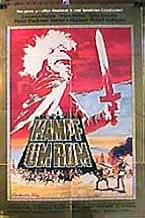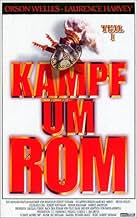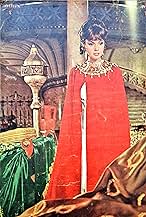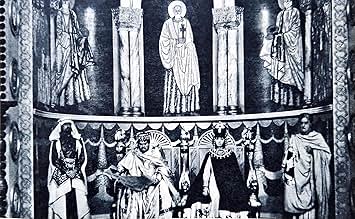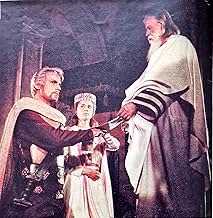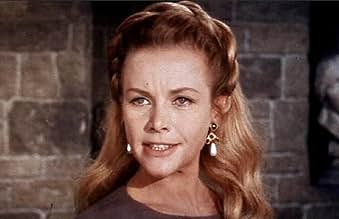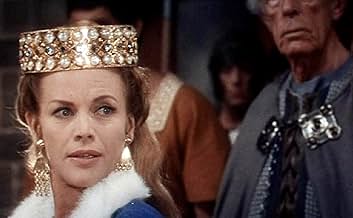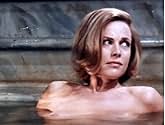Füge eine Handlung in deiner Sprache hinzuCethegus, leader of the Roman nobility, travels to Bizantium and its leader Justinian, in an attempt to raise an army to march on the Goths under Narses. Cethegus would like to set the two s... Alles lesenCethegus, leader of the Roman nobility, travels to Bizantium and its leader Justinian, in an attempt to raise an army to march on the Goths under Narses. Cethegus would like to set the two sides to war against each other, that his own forces might take control at the outcome.Cethegus, leader of the Roman nobility, travels to Bizantium and its leader Justinian, in an attempt to raise an army to march on the Goths under Narses. Cethegus would like to set the two sides to war against each other, that his own forces might take control at the outcome.
- Regie
- Drehbuch
- Hauptbesetzung
- Julia
- (as Ingrid Brett)
Empfohlene Bewertungen
This is a complex, well plotted film. It is no Ben Hur, but the characters are engaging, the political intrigue is very well developed, the acting quite good (Laurence Harvey's final scene is great) and the battle scenes truly epic. In an unusual bit a casting, Michale Dunn plays Justinian's general Narses and, in great performance,steals almost every scene he is in. This is a quite good unjustly neglected epic well worth tracking down and seeing. It was released on video tape in the late 1970's but not in wide screen which this film really needs, and Honour Blackman's topless scene was, alas,cropped to just a closeup from the neck up.
In the sixties he was doing movies which were not really personal (with the exception of "tunnel 28" ,about the wall of Berlin) ,potboilers , but not uninteresting ("der Schut " is a fine adventures yarn )
The peplum (sword and sandals ) genre was a bit obsolete in the late sixties,whereas it was a dominant one earlier ; this one has an international cast ,with big names,which was not often the case in early Italian peplums ;no muscle man but a bevy of famous stars even Orson Welles-who really seemed to consider Siodmak's film a potboiler and quickly quit the screen after two scenes (the first one ending with a nonchalant "let's pray".)
Forget history and you almost have a pilot for an imaginary miniseries (although there's a second episode , there are so many subplots you can't count them all ); the Honor Blackman/Bergmanian Harriet Anderson feud, the Roman girl in love with a Goth count , their king forced to marry a princess and to -reluctantly- renege on his peasant wife (in the meantime ,their beloved son has been taken hostage )...history is only a vague background ,very storylike .
Siodmak nevertheless showed he had not lost his flair for film noir : Blackman's deadly bath is worthy of his scary movies ; the film abruptly ends ,to make the audience come back and see the second installment .
Of course it does not compare favorably with most of the director's works, but it's entertaining stuff and ,athough not the epitaph the director deserved, you can save it (them,do not forget the second episode) for a rainy day.
A disjointed and heavily cut film based on the novel written by Felix Dahn , dealing with the downfall of the Roman Empire and taking very freely the actual facts . It packs moving drama with twisted events , betrayal , brief nudism , and especially impressive battles . In the picture stands out the breathtaking battles staged by thousands of extras from Romania and in charge of two director assistants : Andrew Marton and Sergiu Nicolaescu , both of whom experts on mass movements . In the film happens some historical happenings as Ostrogoths and Bizantine invasion over Rome . Equally , appearance of some important historical characters as Emperor Justinian stunningly played by Orson Welles , his greedy wife Theodora : Sylva Koscina , General Belisarius : Lang Jeffries and Narses : Michael Dunn.
It displays an atmospheric cinematography by Richard Angst , shot on location in Romania , Buftea studios , Bucharest and Germany, however , being really necessary a perfect remastering, because of the film copy is washed-up . As well as evocative musical score by Riz Ortalani . The motion picture was regularly directed by the prestigious filmmaker Robert Siodmak . This notorious German director emigrated to Hollywood when he made nice films , such as : "Phantom Lady" , "Son of Dracula" , "Christmas Holiday" , "The Suspect" , "The Strange Affair of Uncle Harry" , "The Dark Mirror" , "The Cobra Queen , "The Killers" , "The Spiral Staircase" , "Criss Cross" , "Cry the City" , "The File of Thelma Jordan" , "The Crimson Pirate" , "The Great Sinner" . Many years later , he returned to his native country where he made inferior films than those he released in Hollywood, such as : "The Devil Strikes at Night" , "Die Ratten" , "The Rough and the Smooth" , "Katia" , "The Yellow One" , "Custer of the West" , "Tunnel 28" , "My School chum", "A Matter of Minutes" , "Treasure of the Aztecs" and his last one , this "The Last Roman" .
THE LAST ROMAN proved to be celebrated director Siodmak's final film: perhaps not the ideal swan-song for him as, apart from Honor Blackman's nasty bath-tub murder, there's little evidence of (or opportunity for) his trademark stylistics. In fact, I'd say that the film bears more the imprint of its producer Arthur Brauner - an expert in exotic exploitation (witness the very discreet, but entirely gratuitous, use of nudity) who had also been the force behind Fritz Lang's last films and would soon collaborate on a number of Jess Franco pictures. Nevertheless, this particular effort abounds in battle sequences that are moderately well-staged - and the plot is so replete with double-crosses, murders and switched allegiances that the viewer's full attention is required throughout; another typical asset of such films is the score and Riz Ortolani provides a serviceable one here.
Apart from the aforementioned Orson Welles and Honor Blackman, the cast is an eccentric mix of international and "Euro-Cult" stars - Laurence Harvey, Sylva Koscina, Michael Dunn, Harriet Andersson, Robert Hoffmann, Ingrid Boulting, Ewa Stroemberg, Lang Jeffries and Friedrich Ledebur; though mostly working below-par, none are especially demeaned by their role in the film (excepting Harvey's embarrassing hairstyle).
In the end, I'd love to check out the full-length version of STRUGGLE FOR ROME (as the original title of this German/Italian/Romanian co-production translates to) someday - but the possibility seems very remote at this stage...
Wusstest du schon
- Alternative VersionenIn Italy, the two parts of "Kampf um Rom" were edited in one movie entitled "La calata dei barbari".
- VerbindungenFeatured in Yang guang can lan de ri zi (1994)
Top-Auswahl
- How long is The Last Roman?Powered by Alexa
Details
- Erscheinungsdatum
- Herkunftsländer
- Sprache
- Auch bekannt als
- The Last Roman
- Drehorte
- Produktionsfirmen
- Weitere beteiligte Unternehmen bei IMDbPro anzeigen
- Laufzeit1 Stunde 33 Minuten
- Sound-Mix
- Seitenverhältnis
- 2.35 : 1
Zu dieser Seite beitragen


